BSBMGT616 Develop and Implement Strategic Plans - Assessment Criteria
Added on 2023-06-07
66 Pages11512 Words103 Views
BSBMGT616
Develop and implement
strategic plans
Learner Workbook
Student’s Name:
Trainer Syed Saqib Hussain Shah
Date: 28/09/2018
Teacher Remarks:
Develop and implement
strategic plans
Learner Workbook
Student’s Name:
Trainer Syed Saqib Hussain Shah
Date: 28/09/2018
Teacher Remarks:
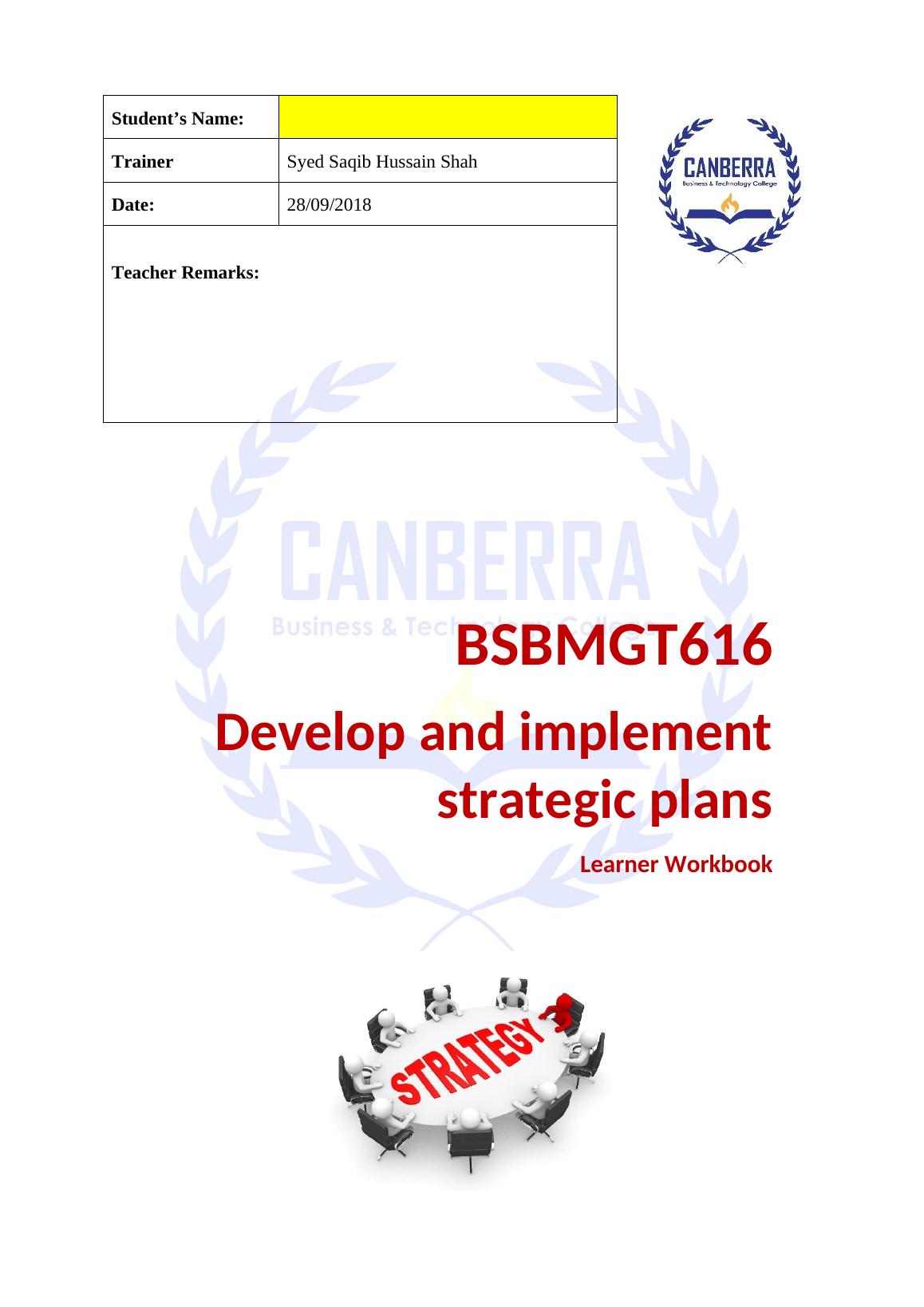
P a g e | 2
Assessment criteria for BSBMGT616
Develop and implement strategic plans
In this document, you will find the foundation of what is required to become competent in
this unit. For further information on each element, you can refer to the Assessment Matrix.
Included in this document are the elements for the unit, foundation skills, assessment
requirements as well as an assessment tool definition list and the crucial observation and third
party check lists. As well as all of the areas covered here, each student must also complete all
workbook activities, case studies and major activities, where stated, to become competent
within this unit.
NOTE – Re-assessment:
Students will have a maximum of two (2) reassessments attempts if competency is not
achieved in the first instance.
The final grade of ‘C’ for Competent or ‘NC’ for Not Competent is only given at the
completion of the unit of competency when all components or parts of the assessment are
graded as ‘S’ for Satisfactory. Unsatisfactory results are marked as NS.
Elements for Competency Demonstration
Elements for Competency Assessment:
1. Confirm organisation vision and mission
2. Analyse internal and external environment
3. Write strategic plan
4. Implement strategic plan
Performance Evidence:
Evidence of the ability to:
Consult and communicate effectively with relevant stakeholders to:
o confirm or revise the organisation’s mission, vision and values
o validate findings of research and analysis
o get input to and endorsement of strategic plans
o brief relevant parties about the plan
Assessment criteria for BSBMGT616
Develop and implement strategic plans
In this document, you will find the foundation of what is required to become competent in
this unit. For further information on each element, you can refer to the Assessment Matrix.
Included in this document are the elements for the unit, foundation skills, assessment
requirements as well as an assessment tool definition list and the crucial observation and third
party check lists. As well as all of the areas covered here, each student must also complete all
workbook activities, case studies and major activities, where stated, to become competent
within this unit.
NOTE – Re-assessment:
Students will have a maximum of two (2) reassessments attempts if competency is not
achieved in the first instance.
The final grade of ‘C’ for Competent or ‘NC’ for Not Competent is only given at the
completion of the unit of competency when all components or parts of the assessment are
graded as ‘S’ for Satisfactory. Unsatisfactory results are marked as NS.
Elements for Competency Demonstration
Elements for Competency Assessment:
1. Confirm organisation vision and mission
2. Analyse internal and external environment
3. Write strategic plan
4. Implement strategic plan
Performance Evidence:
Evidence of the ability to:
Consult and communicate effectively with relevant stakeholders to:
o confirm or revise the organisation’s mission, vision and values
o validate findings of research and analysis
o get input to and endorsement of strategic plans
o brief relevant parties about the plan
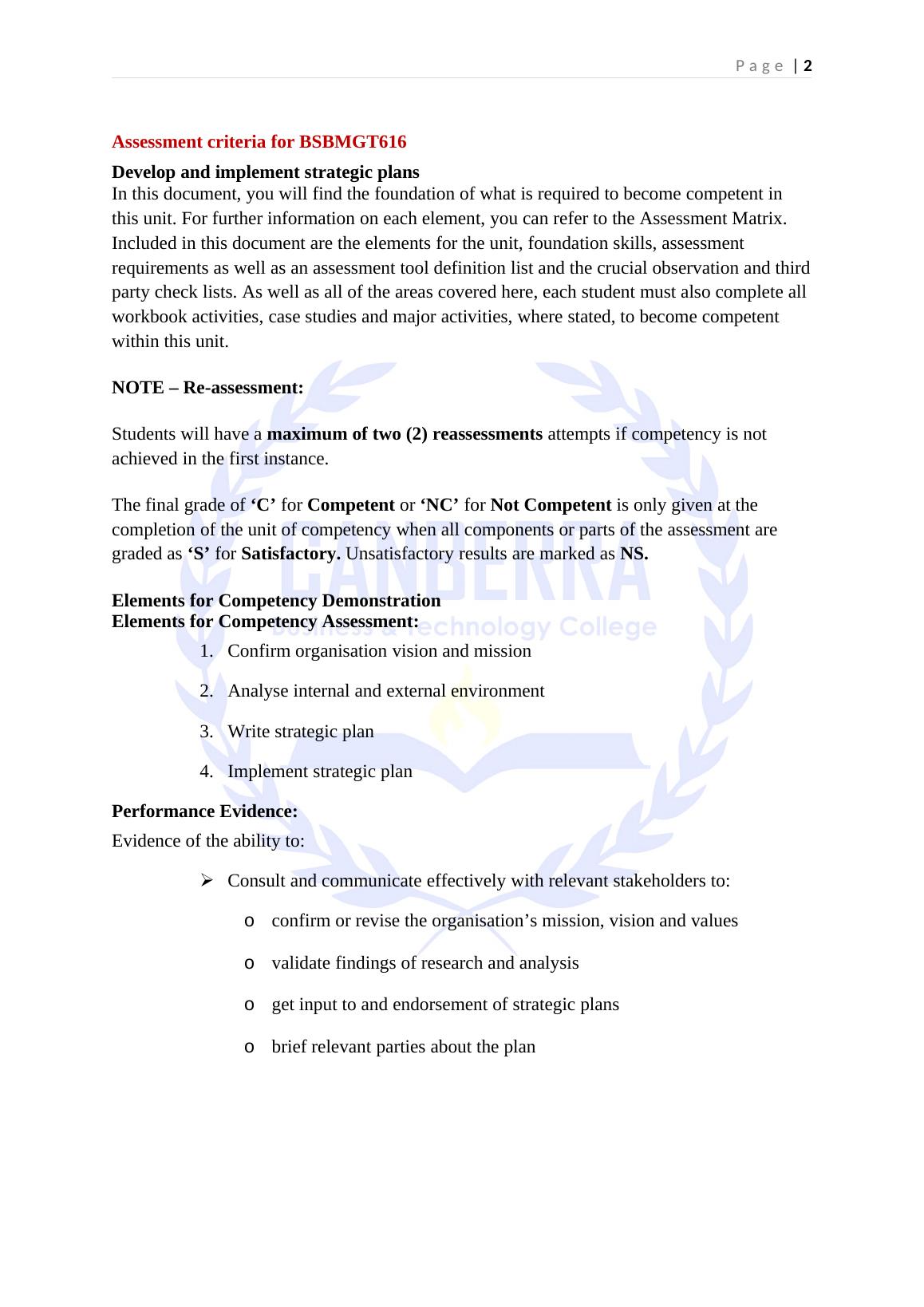
P a g e | 3
Analyse organisation’s internal and external environment to formulate
strategic plans including:
o background and research relevant to the plan
o legislation, regulations and codes of practice, including for intellectual
property
o objectives, strategies and priorities
o roles and responsibilities
o performance indicators
o timeframes
o consideration of co-operative ventures
o cost-benefit and risk analysis
Seek advice from appropriate experts wherever necessary
Monitor and evaluate the implementation of the plan and make refinements as
appropriate
Review effectiveness of planning processes and identify opportunities for
improvement
Foundation Skills:
Reading
Identifies and analyses complex organisational texts to determine business
requirements
Reviews, evaluates, interprets and applies content from a range of sources to
aid in development of strategies
Writing
Prepares strategic plans for relevant stakeholders incorporating appropriate
vocabulary, grammatical structure and conventions
Incorporates amendments to documents according to organisational
requirements
Collates and compiles data to convey specific information, requirements and
recommendations
Analyse organisation’s internal and external environment to formulate
strategic plans including:
o background and research relevant to the plan
o legislation, regulations and codes of practice, including for intellectual
property
o objectives, strategies and priorities
o roles and responsibilities
o performance indicators
o timeframes
o consideration of co-operative ventures
o cost-benefit and risk analysis
Seek advice from appropriate experts wherever necessary
Monitor and evaluate the implementation of the plan and make refinements as
appropriate
Review effectiveness of planning processes and identify opportunities for
improvement
Foundation Skills:
Reading
Identifies and analyses complex organisational texts to determine business
requirements
Reviews, evaluates, interprets and applies content from a range of sources to
aid in development of strategies
Writing
Prepares strategic plans for relevant stakeholders incorporating appropriate
vocabulary, grammatical structure and conventions
Incorporates amendments to documents according to organisational
requirements
Collates and compiles data to convey specific information, requirements and
recommendations
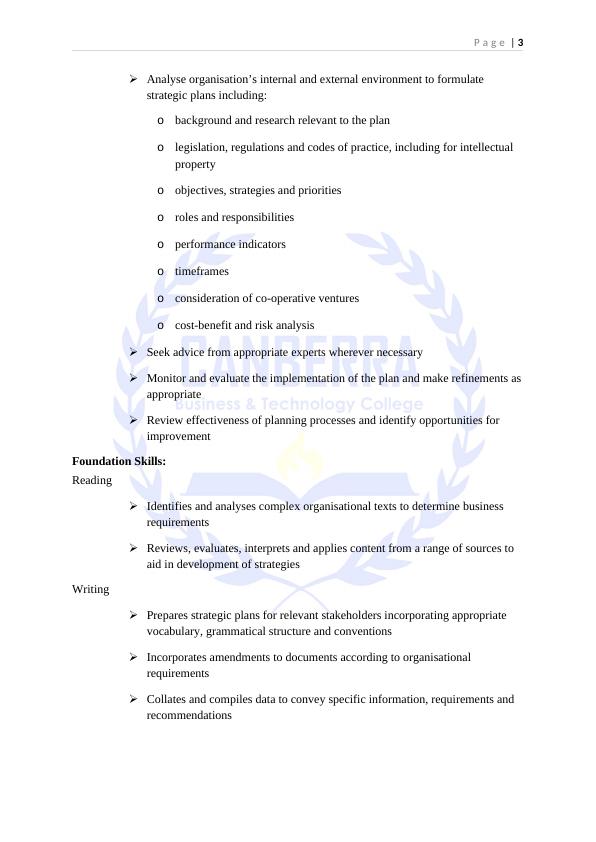
P a g e | 4
Oral Communication
Presents information and seeks advice using language and register appropriate
to audience
Participates in discussions using listening and questioning to elicit the views
of others and to clarify or confirm understanding
Numeracy
Interprets and analyses statistical data and mathematical information to
consider trends and resource implications of proposed strategies
Navigate the world of work
Works autonomously making high level decisions to achieve and improve
organisational goals
Takes a lead role in the development of strategies to achieve organisational
goals
Interact with others
Selects and uses appropriate conventions and protocols when communicating
with internal and external stakeholders to seek or share information
Collaborates with others to achieve joint outcomes, playing an active role in
facilitating effective group interaction, influencing direction and taking a
leadership role
Seeks feedback or expert advice where required
Get the work done
Develops flexible plans for complex, high impact activities with strategic
implications, taking into account capabilities, efficiencies and effectiveness
Systematically gathers and analyses all relevant information and evaluates
options to inform decisions about organisational strategies
Evaluates outcomes to identify opportunities for improvement
Applies problem solving processes to identify risks, evaluate options and
determine solutions
Oral Communication
Presents information and seeks advice using language and register appropriate
to audience
Participates in discussions using listening and questioning to elicit the views
of others and to clarify or confirm understanding
Numeracy
Interprets and analyses statistical data and mathematical information to
consider trends and resource implications of proposed strategies
Navigate the world of work
Works autonomously making high level decisions to achieve and improve
organisational goals
Takes a lead role in the development of strategies to achieve organisational
goals
Interact with others
Selects and uses appropriate conventions and protocols when communicating
with internal and external stakeholders to seek or share information
Collaborates with others to achieve joint outcomes, playing an active role in
facilitating effective group interaction, influencing direction and taking a
leadership role
Seeks feedback or expert advice where required
Get the work done
Develops flexible plans for complex, high impact activities with strategic
implications, taking into account capabilities, efficiencies and effectiveness
Systematically gathers and analyses all relevant information and evaluates
options to inform decisions about organisational strategies
Evaluates outcomes to identify opportunities for improvement
Applies problem solving processes to identify risks, evaluate options and
determine solutions

P a g e | 5
Knowledge Evidence:
To complete the unit requirements safely and effectively, the individual must:
Outline the legislation, regulations and codes of practice relevant to the
organisation’s strategic plan
Give examples of risks and risk management strategies relevant to strategic
planning including:
o intellectual property rights and responsibilities
o other risks
Outline strategic planning methodologies including political, economic, social
and technological (PEST) analysis and strengths, weaknesses, opportunities
and threats analysis (SWOT)
Identify internal and external sources of information relevant to the
organisation's market, competitors, customer base, vision, values and
capabilities
Outline techniques for developing organisational values
Assessment Conditions:
Assessment must be conducted in a safe environment where evidence gathered demonstrates
consistent performance of typical activities experienced in the management and leadership
field of work and include access to:
Relevant legislation, regulations, standards and codes
Workplace documentation and resources
Case studies and, where possible, real situations
Interaction with others.
Assessors must satisfy NVR/AQTF assessor requirements.
Links:
Companion volumes available from the IBSA website:
http://www.ibsa.org.au/companion_volumes
Any observations and practical assessments must be recorded in the observation checklist.
All practical tasks should be demonstrated during the length of the course. As the instructor,
you must maintain a record demonstrating the date of the practical activities and any
comments relevant to the performance of each student. Where a student is not able to
demonstrate competence in a practical observation activity, further questioning should be put
in its place.
Knowledge Evidence:
To complete the unit requirements safely and effectively, the individual must:
Outline the legislation, regulations and codes of practice relevant to the
organisation’s strategic plan
Give examples of risks and risk management strategies relevant to strategic
planning including:
o intellectual property rights and responsibilities
o other risks
Outline strategic planning methodologies including political, economic, social
and technological (PEST) analysis and strengths, weaknesses, opportunities
and threats analysis (SWOT)
Identify internal and external sources of information relevant to the
organisation's market, competitors, customer base, vision, values and
capabilities
Outline techniques for developing organisational values
Assessment Conditions:
Assessment must be conducted in a safe environment where evidence gathered demonstrates
consistent performance of typical activities experienced in the management and leadership
field of work and include access to:
Relevant legislation, regulations, standards and codes
Workplace documentation and resources
Case studies and, where possible, real situations
Interaction with others.
Assessors must satisfy NVR/AQTF assessor requirements.
Links:
Companion volumes available from the IBSA website:
http://www.ibsa.org.au/companion_volumes
Any observations and practical assessments must be recorded in the observation checklist.
All practical tasks should be demonstrated during the length of the course. As the instructor,
you must maintain a record demonstrating the date of the practical activities and any
comments relevant to the performance of each student. Where a student is not able to
demonstrate competence in a practical observation activity, further questioning should be put
in its place.
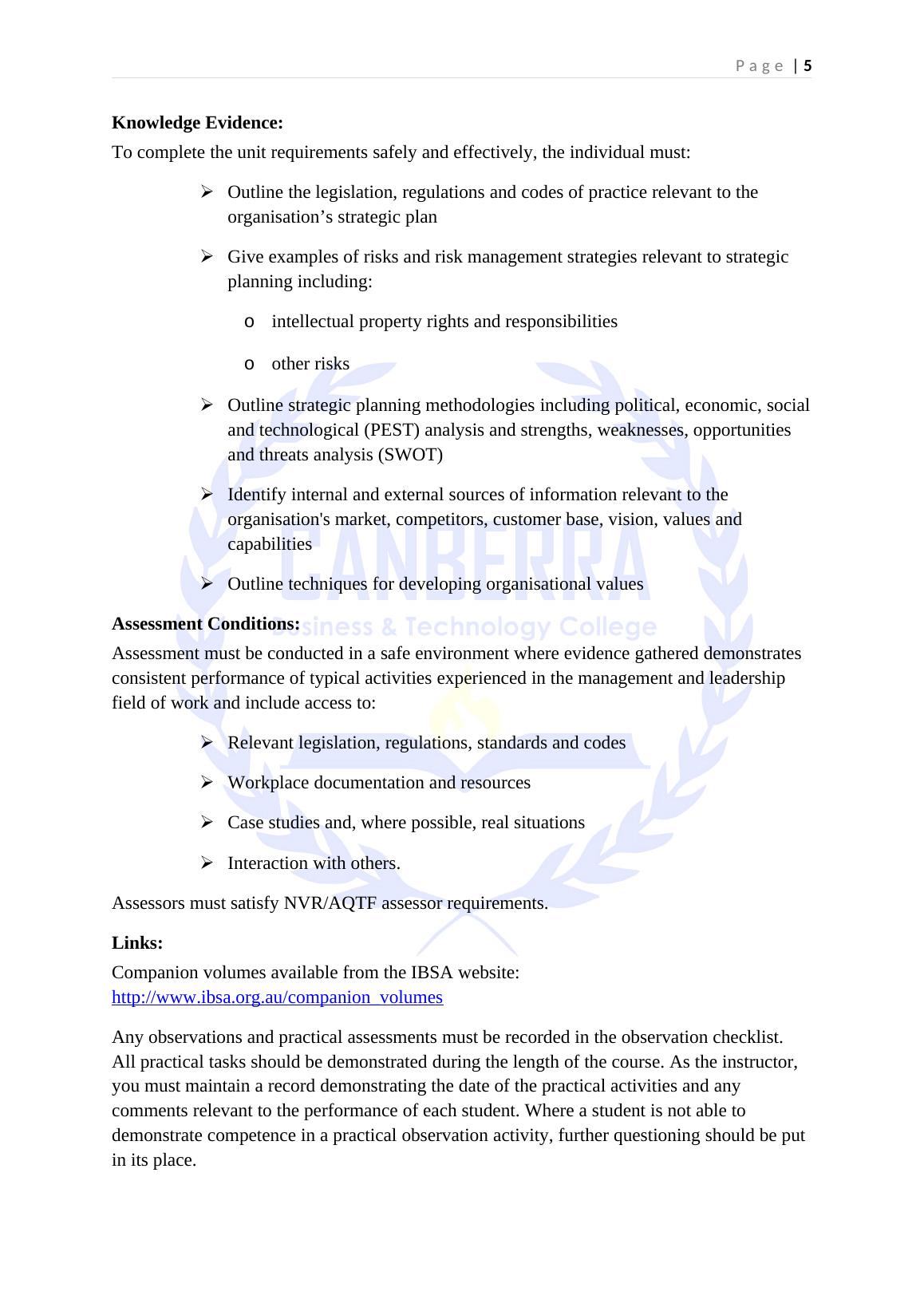
P a g e | 6
As the instructor, you could be assessing the student’s literacy, numeracy and language skills,
as well as the content and context of his/her answers. In some cases, you will have to adjust
and amend the assessment tools, using different and varied methods (such as oral
assessment), to allow students to be assessed according to their needs and abilities.
As the instructor, you could be assessing the student’s literacy, numeracy and language skills,
as well as the content and context of his/her answers. In some cases, you will have to adjust
and amend the assessment tools, using different and varied methods (such as oral
assessment), to allow students to be assessed according to their needs and abilities.
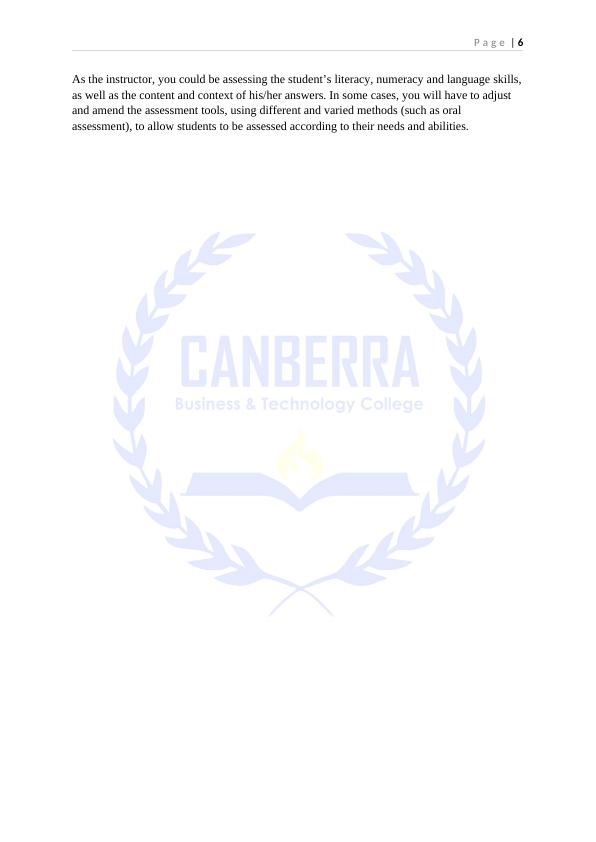
P a g e | 7
Assessment Tool Definitions
Assessment Tool How is it used? What is it?
Learner Workbook Activities
(Entire completion is required)
Each student should be given a Learner
Workbook which will hold a number of
activities, both formative and summative,
that all need to be completed in conjunction
with the appropriate sessions. The
PowerPoint, Learner Guide and instructor
should provide further information to help
with the activities.
Observation/Demonstration
(To be completed for each numbered point
as stated on the checklist)
An observation should be completed for
each of the students by the instructor. If the
tasks aren’t everyday actions, a simulated
environment is acceptable, or a
demonstration can be set up. An
observation checklist can be found at the
end of this document.
Major Activity
(Entire completion is required)
A Major Activity is a summative
assessment and can be found in the Learner
Workbook, after all of the activities are
completed. This is an extended piece of
summative assessment which should take
anywhere between 1-2 hours and every
student should complete this work. It is a
requirement for each unit to check
knowledge and understanding.
Skills and Knowledge Activity
(Entire completion is required)
A Skills and Knowledge Activity is a
summative assessment and is found before
the Major Activity in the Learner
Workbook. This should take between 1-2
hours and every student should complete
this work. It is a requirement for each unit
to check knowledge and understanding of
the foundation skills and knowledge
evidence.
Third Party
(To be completed for each numbered point
as stated on the checklist)
A Third Party checklist is very similar to
an Observation Checklist in its format, but
it can be completed by someone who works
with the learner and has witnessed them
completing tasks which coincide with the
elements of the unit. The checklist can be
found at the end of this document.
Case Study
(Entire completion is required)
Not all units will have Case Studies but
those that do will be clearly stated within
the PowerPoint and the Learner Workbook.
It will appear as any other activity, but it
will be named ‘Case Study’ and will
provide an example of a possible real life
situation for the learner to read, interpret
and then answer questions on.
Assessment Tool Definitions
Assessment Tool How is it used? What is it?
Learner Workbook Activities
(Entire completion is required)
Each student should be given a Learner
Workbook which will hold a number of
activities, both formative and summative,
that all need to be completed in conjunction
with the appropriate sessions. The
PowerPoint, Learner Guide and instructor
should provide further information to help
with the activities.
Observation/Demonstration
(To be completed for each numbered point
as stated on the checklist)
An observation should be completed for
each of the students by the instructor. If the
tasks aren’t everyday actions, a simulated
environment is acceptable, or a
demonstration can be set up. An
observation checklist can be found at the
end of this document.
Major Activity
(Entire completion is required)
A Major Activity is a summative
assessment and can be found in the Learner
Workbook, after all of the activities are
completed. This is an extended piece of
summative assessment which should take
anywhere between 1-2 hours and every
student should complete this work. It is a
requirement for each unit to check
knowledge and understanding.
Skills and Knowledge Activity
(Entire completion is required)
A Skills and Knowledge Activity is a
summative assessment and is found before
the Major Activity in the Learner
Workbook. This should take between 1-2
hours and every student should complete
this work. It is a requirement for each unit
to check knowledge and understanding of
the foundation skills and knowledge
evidence.
Third Party
(To be completed for each numbered point
as stated on the checklist)
A Third Party checklist is very similar to
an Observation Checklist in its format, but
it can be completed by someone who works
with the learner and has witnessed them
completing tasks which coincide with the
elements of the unit. The checklist can be
found at the end of this document.
Case Study
(Entire completion is required)
Not all units will have Case Studies but
those that do will be clearly stated within
the PowerPoint and the Learner Workbook.
It will appear as any other activity, but it
will be named ‘Case Study’ and will
provide an example of a possible real life
situation for the learner to read, interpret
and then answer questions on.
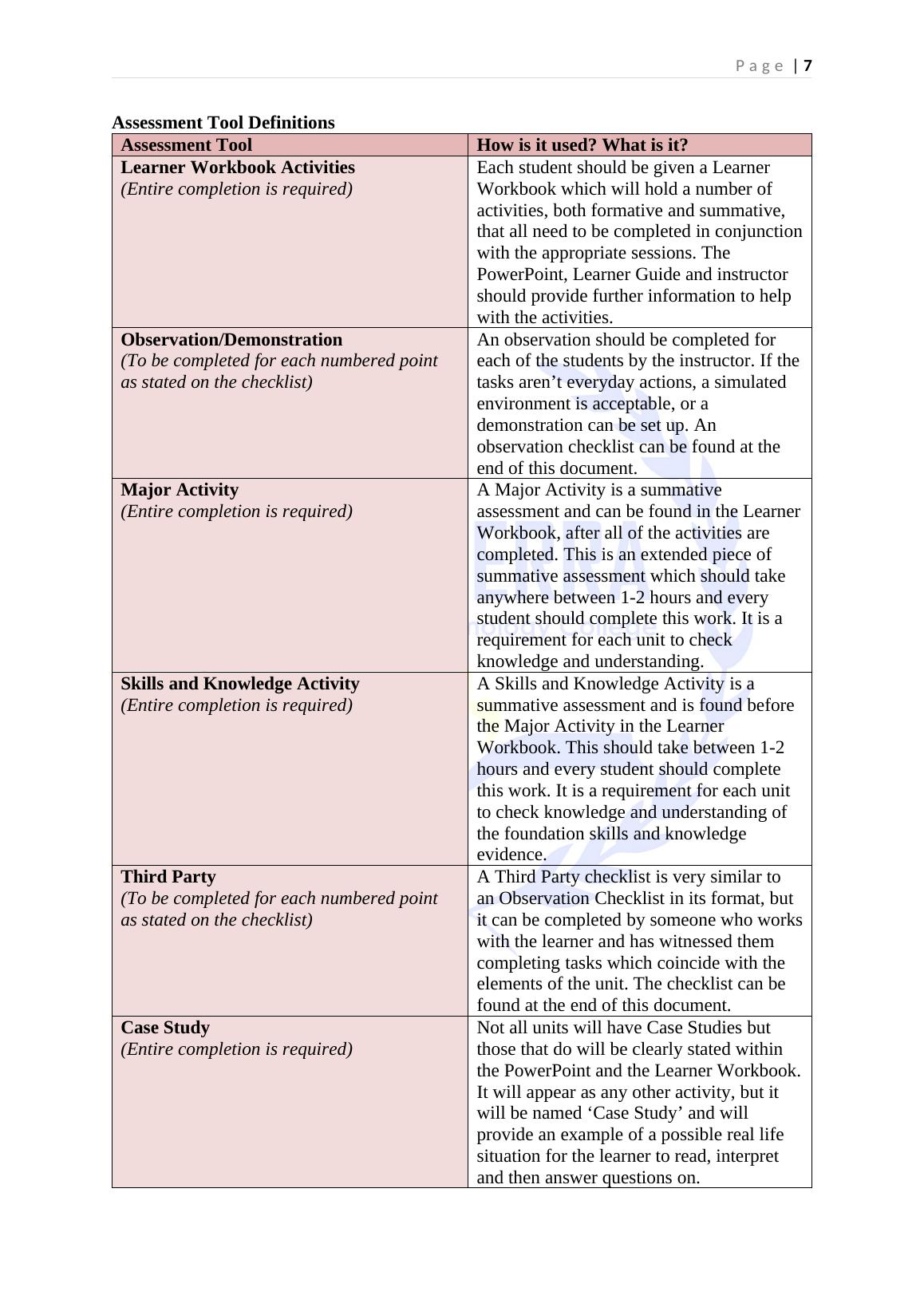
P a g e | 8
Learner Guide
(To be used as an informational guide)
The Learner Guide links with the Learner
Workbook as it provides the information
given during sessions and more. It can help
students to further their knowledge and to
also complete the activities.
Evidence Document
(Not a necessity for completion of unit but
can be used as an aid or to collect further
evidence)
The Evidence Document lists all of the
Elements and Performance Criteria with an
area for written reports etc, to add evidence
to the student’s portfolio. It can be used for
any of the performance criteria, especially
those which may not have been covered by
any other assessment tool. The student can
circle a number of the criteria that they
may feel they need further evidence of or it
can be used as a guide for completing
further Observations and Third Party
reports.
Learner Guide
(To be used as an informational guide)
The Learner Guide links with the Learner
Workbook as it provides the information
given during sessions and more. It can help
students to further their knowledge and to
also complete the activities.
Evidence Document
(Not a necessity for completion of unit but
can be used as an aid or to collect further
evidence)
The Evidence Document lists all of the
Elements and Performance Criteria with an
area for written reports etc, to add evidence
to the student’s portfolio. It can be used for
any of the performance criteria, especially
those which may not have been covered by
any other assessment tool. The student can
circle a number of the criteria that they
may feel they need further evidence of or it
can be used as a guide for completing
further Observations and Third Party
reports.
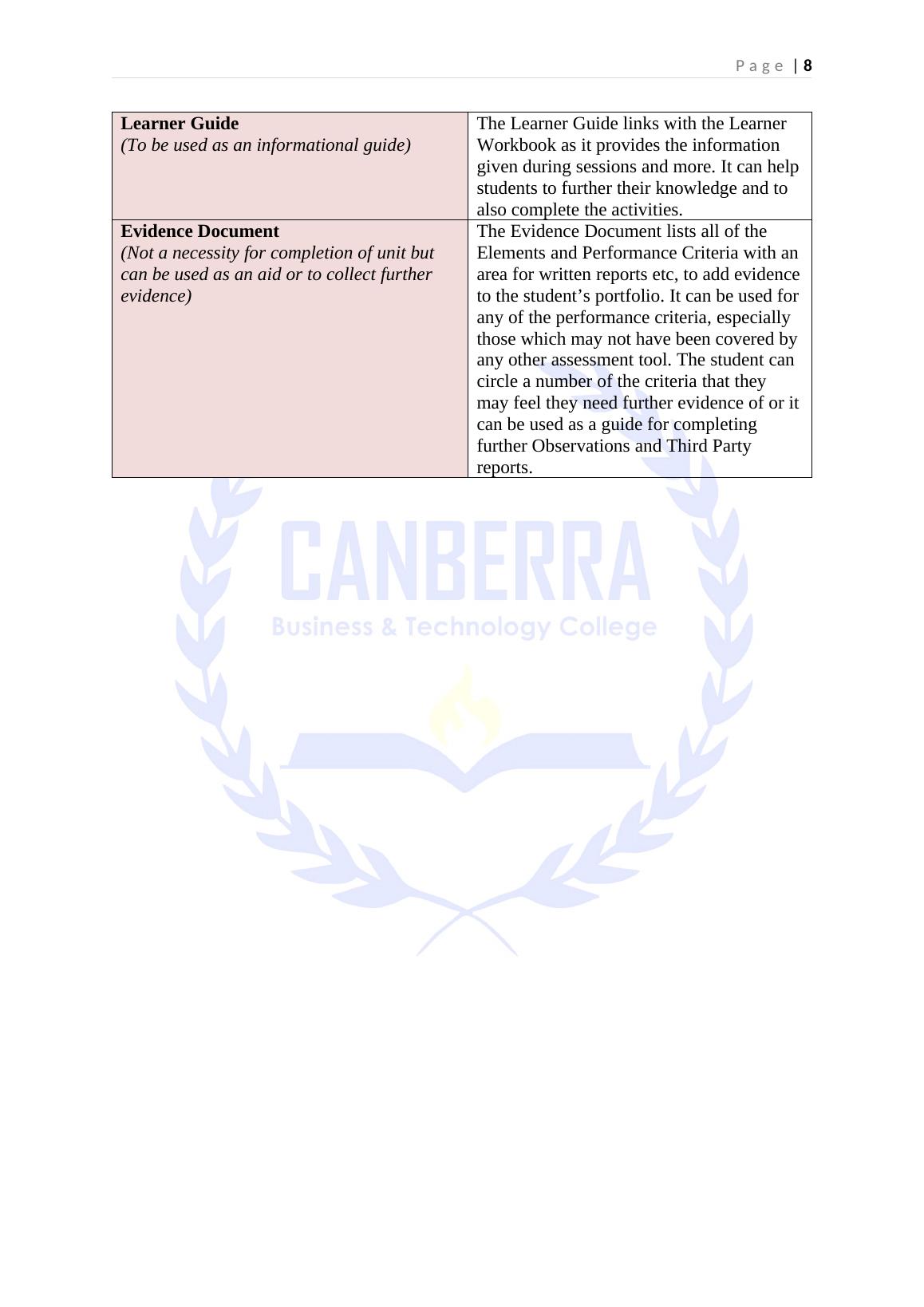
End of preview
Want to access all the pages? Upload your documents or become a member.
Related Documents
BSBMGT616 - Develop and Implementlg...
|40
|7584
|17
Assessment criteria for BSBSUS501 Develop Workplace Policy and Procedures for Sustainabilitylg...
|48
|9105
|85
BSBRSK501 Manage Risk Learner Workbooklg...
|103
|12099
|172
Assessment Criteria for BSBHRM602 Manage Human Resources Strategic Planninglg...
|57
|10077
|341
BSBDIV601 Develop and Implement Diversity Policylg...
|51
|7263
|221
BSBMGT615 Contribute to Organisation Development Learner Workbooklg...
|49
|10941
|429